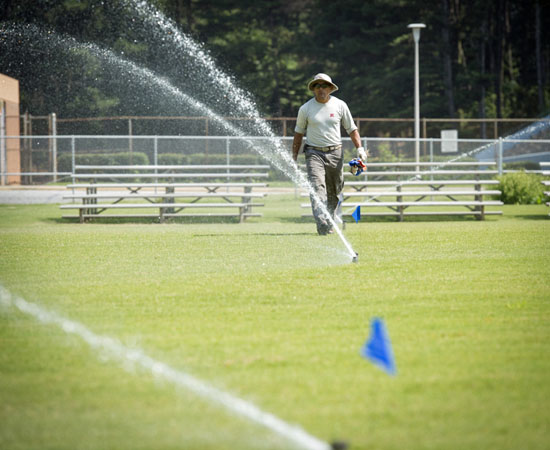
GPC groundskeeper Rolando Aquilar adjusts sprinkler heads at soccer field on Clarkston Campus. (photo by Bill Roa)
Heat waves, airplanes and eggs
It’s so hot.
Just ask Georgia Perimeter’s Dr. Laura Whitlock, a former New Mexico resident who dealt with 100-plus degree days in her former state.
“Even though the temperature may be just as hot out West, this weather definitely seems hotter,” says Whitlock, science chair on Georgia Perimeter College’s Alpharetta Campus. “We cool off by sweating and when the air is dry, our sweat can evaporate fairly quickly and it cools us—we don’t feel the heat as much. Here in the South, when there’s a lot of water in the air, the water on our skin has a harder time evaporating and we don’t get the cooling effect.”
Even inanimate objects such as airplanes have trouble dealing with the heat, she adds.
Planes have been grounded when it’s been too hot, says Whitlock. That’s what happened to a U.S. Airways plane, which was grounded June 17 in Las Vegas because of the heat. Las Vegas has been experiencing temperatures recently of 105-110 degrees.
Whitlock, also a former NASA scientist, confirmed the physics of “too hot to fly.”
“When things get really hot, the air becomes less dense as the temperature goes up, and that means there is less air flowing through the [jet’s] engine,” she points out. “The engine doesn’t burn fuel as efficiently, and that means not much thrust to lift the plane. Plus, you need those dense air particles flowing across the wings to get that lift.”
“Planes can fly in the heat,” she adds, “but they fly less efficiently and then need a longer runway in order to take off. To counteract that, they can either dump fuel or let people off the plane to make the plane lighter.”
In the U.S. Airways case, 12 people left the plane to lighten the load.
The “too hot to fly” issue probably would never occur at Atlanta’s Hartsfield-Jackson Airport, even when temperatures go above 100, she says, because the airport has very long runways.
As to that old adage, “it’s so hot, you can fry an egg on the sidewalk,” Whitlock offers some cooking tips.
Try the parking lot blacktop or a car hood, for best results, she says. “It should take under 10 minutes these days. It will be uneven, but an egg white coagulates at 145 degrees, the yolk at 155. “
Related story: A few tips to help you keep your cool. Read more.
